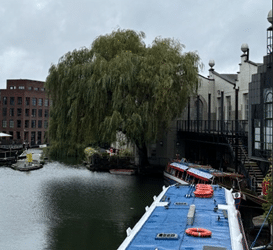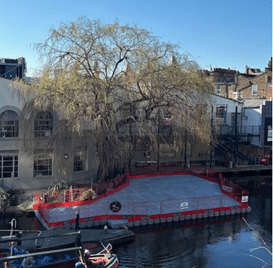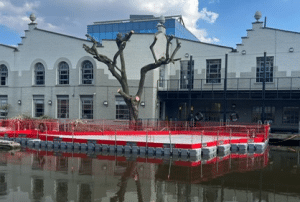Managing Tree Safety on London’s Historic Canal Network
Location: Hawley Lock, Regent’s Canal, Camden, London NW1
Connick Tree Care worked in conjunction with the Canal & River Trust to carry out a technically complex re-pollard of a mature willow tree located at Hawley Lock in Camden.
The project took place directly on the banks of the Regent’s Canal, an ecologically sensitive, high-footfall location near Camden Market, requiring careful planning and precision execution.
This project exemplifies our ability to deliver complex arboricultural services in urban environments, underpinned by strict compliance with BS 3998:2010 and UK environmental legislation.
Challenges and Constraints
The mature willow exhibited extensive regrowth from previous pollarding cycles, with decayed unions posing a structural risk to boat traffic and the lock gate mechanism. With no direct land access to the tree, and its position perched above water, traditional approaches were not viable.
The site’s constraints included:
- No land-based access for machinery or MEWPs.
- High pedestrian traffic and towpath users.
- Strict environmental controls due to the canal’s protected status.
Our Approach
Floating Work Platform
To access the tree, our team installed a floating modular pontoon, manually assembled and secured on-site. This acted as a crash deck and a safe, stable platform for arborists.
The pontoon met all Canal & River Trust navigational safety requirements, including night visibility lighting and ‘No Mooring’ signage, and remained partly in place overnight under permit conditions.
Sectional Tree Work
All tree surgery was completed in accordance with BS 3998:2010, Sections 4–8. A two-rope rigging system was used to lower each branch under control, avoiding any impact with the canal. Our team included:
- NPTC CS38/39-certified climbing arborists
- An SSSTS-accredited team leader overseeing works
This meticulous method ensured no debris entered the water, meeting Canal & River Trust’s zero-pollution requirements.
Safety and Environmental Protection
- Nesting bird and habitat surveys were carried out in line with the Wildlife and Countryside Act 1981 and BS 42020.
- Floating silt boom screens were deployed to contain fine debris.
- Refuelling took place onshore using spill-mats and designated containment procedures.
- Daily toolbox talks and dynamic risk assessments supported on-site safety, while all operatives wore automatic lifejackets and appropriate PPE.
Results
- Zero incidents or pollution events recorded
- Project completed within the five-day programme
- No public complaints or disruption to canal navigation
- All arisings removed daily, and the site left clean and fully reinstated
The willow was safely retained with structurally sound pollard heads, and re-growth potential preserved supporting both tree longevity and site aesthetics.
Before, During and After

Before: Willow tree with overgrown regrowth before works.

During: Pontoon and arborists in action during sectional dismantling.

After: Tree after re-pollard with clean structure and clear canal access
Why Connick Tree Care?
This project is a testament to our credentials as an Arboricultural Association Approved Contractor, operating under ISO 9001, ISO 14001 and ISO 45001 certifications. It reflects our commitment to:
- Safe and sustainable tree management
- Professionalism in challenging environments
- Helping clients uphold their legal and environmental responsibilities
If you have a complex arboricultural challenge, then please contact us.
Our Accreditations









